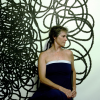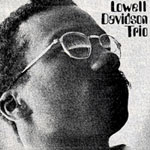Home » Jazz Articles » Album Review » Lowell Davidson: Trio
Lowell Davidson: Trio
The seamless blending of musicians is often rare, especially in the instance of improvisation, because inherent in the situation is the heightened responsiveness of the musicians to each other. In the re-released 1965 recording entitled Trio, from the late pianist Lowell Davidson with bassist Gary Peacock and drummer Milford Graves, the interaction among musicians is cultivated and beautifully expressed.
The language which the trio speaks has the same syntax. The phrasing is isolated and abstract. Just as the piano can move along in a series of quasi-fluid phrases, the drums and bass counteract that motion with just as many interpretations of the dynamic. All three instruments behave with a peculiar but common lyricism, which penetrates the entire recording.
One salient reason why these three musicians groove together is that they permit themselves to separate one note or phrase from another, because they each know intuitive logic will always present the next place. The way that Davidson flutters through the treble keys; Gary Peacock grabs at the strings of the bass in a stiff pizzicato; and Milford Graves clarifies that drumming can both echo and introduce new sound timbres, moves the music through time. "Ad Hoc" demonstrates the acumen of all three instrumentalists: the piano introduces the essence of the music, Peacock improvises and hands over to drummer Graves who, in turn, hands over to Davidson. The pianist takes off in an indeterminate yet succinctly defined, mostly high-pitched direction, transforming the musical line again as the drums and bass tap lightly into a grand, concerto-like statement.
Davidson can indicate melody, but quickly breaks it down into sparks, trills and dissonant blinks; it is gradually reconstituted as the bass and drums reunify the trio in the original tune. Peacock's stamina for technically emphasizing successively subtle pitch changes, and Graves' relentless attention to the impact and placement of sporadic drumming, both lead and support the piano through raucous time to reach peaceful havens of melody (as demonstrated on "L" and "Stately").
There is something that is so sweet but, at the same time, rational and evanescent about Davidson's musical concepts. The primary force of the piano music is laid out forcefully on "Dunce," backed by Peacock's legato bowing and Graves' refined mallet thumping; and that it never retreats and is evenly perpetuated speaks to Davidson's comprehension of maintaining the consistency of the music. This strength is exemplified as Davidson bounces lightly across the treble, and as a complement, lands in a bass chord to keep the music in balance on "Ad Hoc."
Any emotion in this music is counteracted with its intellectualization. Twittering piano notes seek restoration in the grounding of bass chords and tremolos. The bass and drums echo equally devoted pursuits of mastering the delicate nature of sensitivity ("Strong Tears"); and those pursuits are conclusive, as is signaled by a precisely dampened rattle of a cymbal.
At the end, it is time to stop and breathe, focus and start all over again. Davidson's mix of reason and heart will remain as his legacy, surely for many years to come.
Track Listing
L; Stately; Dunce; Ad Hoc; Strong Tears.
Personnel
Lowell Davidson
pianoLowell Davidson: piano; Gary Peacock: bass; Milford Graves: drums.
Album information
Title: Trio | Year Released: 2008 | Record Label: ESP Disk
Tags
PREVIOUS / NEXT
Support All About Jazz
 All About Jazz has been a pillar of jazz since 1995, championing it as an art form and, more importantly, supporting the musicians who make it. Our enduring commitment has made "AAJ" one of the most culturally important websites of its kind, read by hundreds of thousands of fans, musicians and industry figures every month.
All About Jazz has been a pillar of jazz since 1995, championing it as an art form and, more importantly, supporting the musicians who make it. Our enduring commitment has made "AAJ" one of the most culturally important websites of its kind, read by hundreds of thousands of fans, musicians and industry figures every month.




















